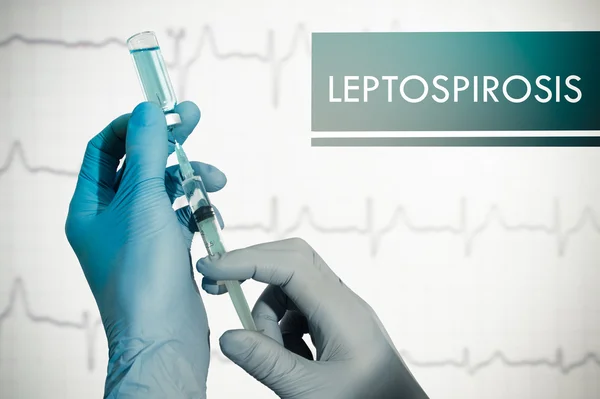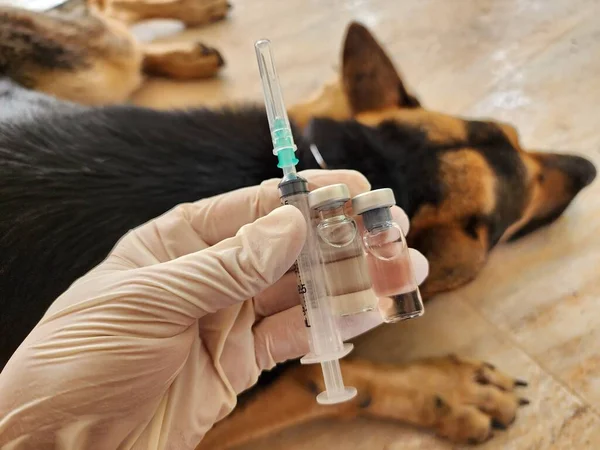Leptospirosis in dogs is one of those illnesses that might sound unfamiliar, but its significance cannot be overstated, especially if you’re a dog owner. This bacterial infection impacts not just our furry friends, but it also poses risks to humans. In this guide, we’ll explore what leptospirosis is, how it affects dogs, and what you can do to prevent it. Whether you’re a pet lover or a veterinary professional, you’ll find valuable insights and tips to safeguard your beloved companions.

What is Leptospirosis?
Leptospirosis is a zoonotic disease caused by the Leptospira bacteria. This sneaky bacterium finds its way into the environment through the urine of an infected animal.
While it might sound like a villain from a sci-fi movie, it’s very real and quite common. It thrives in standing water, urine-soaked soil, and contaminated water sources, making certain environments particularly risky for dogs.
The disease spreads through direct contact with infected urine or contaminated water. Dogs are commonly affected as they love to romp in puddles and explore interesting scents in moist environments.
Whether in urban areas, dog parks, or near farms, the risk is always present. Once infected, a dog can become a carrier, shedding bacteria in their urine and potentially infecting other animals or humans.

Recognizing Leptospirosis in Dogs
Spotting the signs of canine leptospirosis early is crucial for effective treatment. Clinical signs can vary widely, but there are some common symptoms to watch out for. Dogs might exhibit flu-like symptoms such as fever, muscle pain, and lethargy. More severe signs can include difficulty breathing, abdominal pain, and jaundice due to liver involvement.
Infected dogs may also show changes in behavior, lack of appetite, and increased thirst or urination. These signs should raise suspicion and prompt immediate veterinary attention. It’s important to note that not all dogs will show the same symptoms, and some might not show any signs at all in the early stages.

The Dangers of Leptospirosis Infection
Left untreated, leptospirosis can lead to severe disease in dogs. The bacteria can cause acute kidney injury, chronic kidney disease, liver disease, and even pulmonary hemorrhage. These conditions can quickly become life-threatening, underscoring the importance of early diagnosis and treatment.
In addition to affecting dogs, leptospirosis is a zoonotic disease, meaning it can spread from animals to humans. This makes it imperative for pet owners to be vigilant and take preventive measures to protect both their pets and themselves. Human leptospirosis can mimic other diseases, making diagnosis challenging without awareness of possible exposure.
How Leptospirosis Spreads
How are dogs infected anyways? Understanding how leptospirosis spreads is key to preventing infections. Dogs can contract the disease through direct contact with infected urine, contaminated water, or urine-contaminated soil. Boarding or training facilities, dog parks, and areas frequented by wild animals pose higher risks due to potential exposure.
The disease can also spread through contact with other infected animals or wildlife. Farm animals, rodents, and other wildlife can carry and spread the bacteria. This broad range of potential carriers makes it essential to maintain good hygiene practices and avoid areas where leptospirosis might be present.

Diagnosing Leptospirosis in Dogs
Diagnosing leptospirosis involves a combination of clinical evaluation and diagnostic tests. Veterinarians often perform tests such as the microscopic agglutination test to confirm the presence of the Leptospira bacteria. Urine testing can also reveal the bacteria, aiding in accurate diagnosis.
For vaccinated dogs, diagnosis might require additional testing due to the possibility of false-positive results from previous vaccinations. It’s crucial to share any relevant history with your veterinarian to ensure the most accurate diagnosis and treatment plan.
Treatment Options for An Infected Dog
If leptospirosis is diagnosed, swift treatment is essential to mitigate the disease’s effects. Treatment typically involves antibiotics such as doxycycline, which can effectively eliminate the bacteria. Fluid therapy is also a common approach to support the dog’s hydration and prevent kidney damage.]
In severe cases, supportive care might be necessary, including nutritional support, iv fluids, and liver or renal replacement therapy. With prompt medical attention, many dogs can recover fully from leptospirosis, but close monitoring and follow-up care are vital.

Preventing Leptospirosis in Dogs
Prevention is better than cure, and fortunately, there are effective measures to reduce the risk of leptospirosis. Vaccination is a key preventive step, offering protection against multiple strains of the bacteria. Regular vaccinations can significantly reduce the chances of infection.
Additionally, avoiding contact with standing water, contaminated environments, and wild animals can help prevent exposure. Pet owners should also consider their dog’s lifestyle and habits, making adjustments to minimize risk. Keeping your dog on a leash during outdoor activities can limit their exposure to potential sources of infection.
Breeds Sensitive to the Leptospirosis Vaccine
While vaccination against leptospirosis is an essential preventive measure, certain dog breeds have been noted to exhibit sensitivity to the leptospirosis vaccine. Understanding which breeds may be more vulnerable can help pet owners and veterinarians make informed choices. Below are some of the breeds that may experience adverse reactions:
- Dachshund: This breed has a predisposition to immune-mediated conditions, which may increase the risk of vaccine reactions. Their smaller size also means that any vaccine-related side effects can be more pronounced.
- Shih Tzu: Known for their delicate health, Shih Tzus can experience reactions such as lethargy or allergic responses post-vaccination. It’s crucial for owners to monitor these dogs closely after receiving the vaccine.
- Chihuahua: Due to their small stature and unique metabolic rates, Chihuahuas can be more susceptible to side effects from vaccines, including the leptospirosis vaccine.
- Collie: Some Collies may have genetic predispositions that affect their immune response to vaccines. It’s important for owners to discuss the potential risks with their veterinarians.
- Boxer: Boxers are known to have a higher incidence of immune system disorders, making them potentially more sensitive to certain vaccinations, including those for leptospirosis.
- English Bulldog: Bulldogs, particularly with their breathing issues and underlying health conditions, can be more vulnerable to vaccine side effects. Close supervision is recommended after vaccination.
For owners of these breeds, it is vital to have thorough discussions with their veterinarians about vaccination alternatives, timing, and monitoring strategies to ensure their dog’s health and well-being.

Creating a Safe Environment for Your Dog
Maintaining a clean and safe environment is crucial in preventing leptospirosis. Regularly clean areas where your dog spends time using an antibacterial cleaning solution or household bleach to disinfect surfaces. Wearing gloves when handling potentially contaminated materials can protect both you and your pets.
For dogs that have a history of infection, taking extra precautions is essential. Isolating infected dogs from other pets and avoiding contact with their body fluids can prevent the spread of bacteria. Always consult your veterinarian for specific advice tailored to your dog’s needs.
The Role of Veterinary Medicine in Leptospirosis Prevention and Treatment
Veterinary professionals play a vital role in preventing and managing leptospirosis. Regular check-ups and consultations help ensure your dog is up-to-date on vaccinations and in good health. Your veterinarian can offer guidance on preventive measures based on your dog’s lifestyle and potential exposure risks.
In cases where leptospirosis is suspected, prompt veterinary intervention is critical. Early diagnosis and treatment can significantly improve outcomes, reducing the risk of severe complications and long-term health issues.
Understanding the Impact of Leptospirosis
Leptospirosis isn’t just a concern for dogs; it has broader implications for animal species and human health. The disease can affect various animals, including farm animals and wildlife, contributing to its widespread nature. Awareness of leptospirosis’s impact on different animal species can help prevent its spread.
For dog owners, understanding the disease’s potential consequences underscores the importance of vigilance and prevention. By staying informed and taking proactive measures, we can protect our furry friends and contribute to a healthier, safer community.

Building a Community of Responsible Pet Owners
Fostering a sense of community among pet owners can make a significant difference in preventing leptospirosis and other diseases. By sharing information, experiences, and preventive strategies, we can collectively work towards safeguarding our beloved pets.
Engaging with veterinary professionals, joining local pet groups, and participating in community events can enhance our knowledge and preparedness. Together, we can create a network of responsible and informed pet owners committed to promoting pet health and well-being.
Other Important Sicknesses in Dogs
In addition to leptospirosis, there are several other serious illnesses that can affect dogs, necessitating awareness and preventive measures from pet owners. Understanding these conditions can help in recognizing the signs and seeking prompt veterinary care.
Canine Parvovirus: Canine parvovirus is a highly contagious viral disease that predominantly affects unvaccinated puppies and can lead to severe gastrointestinal distress. Symptoms include vomiting, diarrhea (often bloody), lethargy, and a sudden loss of appetite. Vaccination is critical in preventing this life-threatening disease.
Kennel Cough: Kennel cough, or canine infectious tracheobronchitis, is a respiratory illness caused by a combination of bacteria and viruses. It is highly infectious, especially in crowded environments like kennels. Symptoms typically include a dry, harsh cough and may be accompanied by sneezing, runny nose, and lethargy. While most cases are mild, severe infections may require medical attention.
Heartworm Disease: Heartworm disease is a parasitic condition caused by bites from infected mosquitoes. It can lead to severe lung disease, heart failure, and other organ damage. Symptoms may not be visible in the early stages but can progress to include coughing, fatigue, and weight loss. Regular heartworm prevention is essential for all dogs, especially in endemic areas.
Distemper: Canine distemper is a viral disease that affects a dog’s respiratory, gastrointestinal, and nervous systems. Symptoms may include fever, watery discharge from the eyes and nose, coughing, vomiting, and neurological signs like seizures. Vaccination is critical for prevention, especially in puppies and unvaccinated dogs.
By staying informed about these and other diseases, dog owners can take proactive steps to ensure the health and safety of their pets. Regular veterinary check-ups, vaccinations, and preventive care play a vital role in protecting dogs from these serious conditions.
Snouts and Stouts Indoor Dog Park and Bar ask that all of our canine friends be vaccinated as we now have a new doggy daycare and fitness program called Club Canine Cardio! Visit our site for more info!=

Conclusion
Leptospirosis in dogs is a serious concern, but with awareness, preventive measures, and prompt veterinary care, we can protect our furry companions from its harmful effects. By understanding the signs, causes, and prevention strategies, you can ensure your dog leads a healthy and happy life.
If you suspect your dog might be at risk, consult your veterinarian immediately. They can provide personalized guidance and support to keep your pet safe. Remember, a little caution goes a long way in safeguarding the health of our beloved pets and the entire community.




